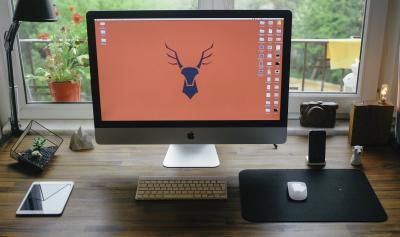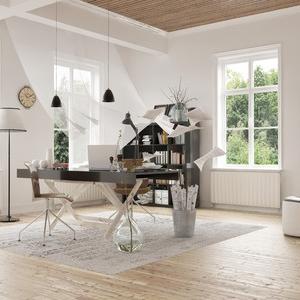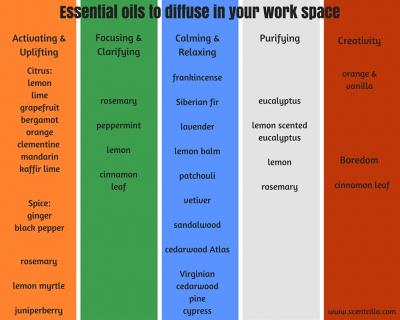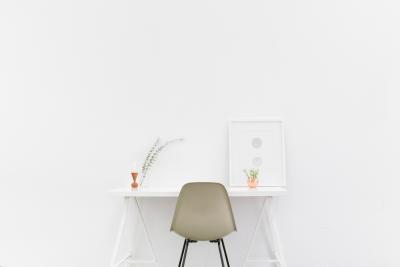Scent has a role in the design of a well-appointed and functioning work space, whether in the home or office setting. Essential oils can be employed in a work environment to encourage a positive mood, foster productivity and creativity and aid in maintaining focus and mental clarity.

Scents for productivity and creativity
How successful an environment is depends on the atmosphere that is created in that space. Thinking about how we can engage all our senses in synergy, rather that one at a time, to promote a pleasant and productive work space leads to a more positive frame of mind.
This strengthens our engagement with our surroundings, making positive moods more likely. When people are in a positive mood they are more likely to be relaxed, efficient, creative, more cooperative and helpful.

Scents have a meaning in our lives and are unique to every individual - relating to their context, our past experience, culture, feelings or the people in our lives. Using scents that are harmonious with the work space attracts our attention and compels the mind to be interested and engaged.
It is a tool we can use as a prompt or mindful pause for a smooth transition to the focused mindset we need to get down to work. This is especially true if you're working from home where the home/work division can be less distinct.


Using essential oils in the work space assists in getting settled and focused when working or studying. Scent can trigger a certain mood or behaviour as a result of associative learning, where the brain links together past experiences. If you use a certain scent when you're working, the mind can connect that scent to a particular experience, helping you to concentrate on the job at hand.

Essential oils can also be incorporated in the work space as part of the principles of biophilic design. This is where nature or nature inspired design themes are employed that strengthen our connections to the physical world and our intrinsic comfort with nature for a more fulfilling work environment.
Diffusing your essential oils in an ultrasonic or cold air diffuser purifies and moistens the air which minimises the drying effects of air conditioning or heating as well as heightening your sensing and experience of these scents.

Essential oils for your work space
I have put together two essential oil blend examples below that are suitable for diffusing in your work area. In the case of a shared work space you can alternatively make a stock bottle of a blend and apply a few drops to a cotton ball, makeup sponge or ceramic stone diffuser.


Blend One: Productivity
5 parts lemon, 3 parts Siberian fir, cedarwood Atlas, 2 parts rosemary and peppermint.
Lemon, rosemary and peppermint are clean, spirited and uplifting scents that support mental clarity and concentration. Fir and wood oils relax and settle.
Including the scents of the forest in our technology focused environments is a way of minimising stress and reinforcing well being.
Blend Two: Creativity
4 parts sweet orange, 3 parts lavender, sandalwood, 2 parts sweet fennel, 1 part vanilla oleoresin.
This draws from a 2012 study that found smelling an orange-vanilla scent before going to bed boosted creativity. Lavender is synonymous with calming and soothing while sandalwood and sweet fennel impart a feeling of warmth and comfort.
Room atmospherics that are catalysts to help generate creative and inspirational ideas include dim lighting and mid level background music- so this blend is best used in the evening hours or before going to bed, in a room with the lights on low and some music in the background.


From the Scentcillo range of essential oil blends, both Shaman and Oracle woud be appropriate choices in crafting a well designed work space.
Shaman blend unites stimulating and energising oils such as lemon, lime and pink grapefruit with a grounding woody base. Aromatic compounds such as limonene found in citrus oils and alpha pinene and cedrol from forest species contribute both to their respective aromas and activating and stress lowering effects.
Oracle blend fuses the uplifting scent of citrus clementine with focusing and calming oils like frankincense, patchouli and cedarwood Atlas.

General design points for a productive and innovative work space:
- Keep it clean, organised and clutter free.
- Ensure appropriate lighting, noise and temperature levels and ergonomic furniture.
- Choose fewer and simple patterns in the decor.
- Curved, symmetric, harmonious forms are relaxing.
- Cooler colours and lower levels of illumination aid in concentration and focus.
- Incorporate an outlook to nature, plants or fresh flowers.

Further reading:
- Tips for a comfortable, functional workspace you’ll love. Interiors Addict.
- How to create the perfect space for study. Houzz.
- Creativity blocked? Try a common scents solution. Pacific Standard.
- Effects of chiral fragrances on human autonomic nervous system parameters and self-evaluation. Chemical Senses. March 2001.
d-limonene in citrus oils caused subjective alertness and restlessness.
- The essential oil of Abies sibirica (Siberian fir) reduces arousal levels after visual display terminal work. Flavour and Fragrance Journal. May 2011.
In this Japanese study, the inhalation of Siberian fir reduced arousal levels after a visual display terminal task which may be useful in offsetting the negative effects of prolonged computer use.
- Plasma 1,8-cineole correlates with cognitive performance following exposure to rosemary essential oil aroma. Ther Adv Psychopharmacol. June 2012.
- The effectiveness of in-vehicle peppermint fragrance to maintain car driver's alertness. Industrial Engineering and Service Science. April 2015.
The results suggest that peppermint is promising to be applied as in-vehicle fragrance in order to maintain drivers’ alertness.
- Reducing boredom using scent to improve constructs critical to learning. Proceedings of the Human Factors and Ergonomics Society Annual Meeting. September 2014.
Results revealed that cinnamon significantly reduced feelings of boredom.






